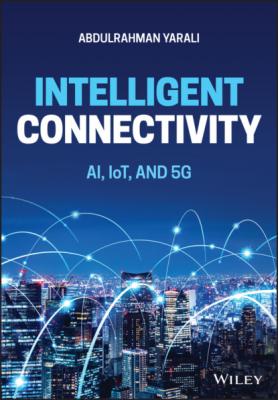ТОП просматриваемых книг сайта:
Intelligent Connectivity. Abdulrahman Yarali
Читать онлайн.Название Intelligent Connectivity
Год выпуска 0
isbn 9781119685210
Автор произведения Abdulrahman Yarali
Жанр Программы
Издательство John Wiley & Sons Limited
References
1 Afshar, V. (2019). Top digital transformation tech investment priorities for 2019: cloud, cybersecurity, and AI | ZDNet. https://www.zdnet.com/article/top‐digital‐transformation‐tech‐investment‐priorities‐for‐2019‐cloud‐cybersecurity‐and‐ai/ (accessed 22 June 2021).
2 Arnold, B. and Shadnam, M. (2014). Innovation goals in software development for business applications. Evolving Trends In Engineering And Technology 1: 53–62. https://doi.org/10.18052/www.scipress.com/etet.1.53.
3 Arxiv (2019). Intelligent user interfaces. https://arxiv.org/ftp/arxiv/papers/1702/1702.05250.pdf (accessed 22 June 2021).
4 Bayern, M. (2019). The future of business tech: six trends that will define the next two decades. https://www.techrepublic.com/article/the‐future‐of‐business‐tech‐6‐trends‐that‐will‐define‐the‐next‐two‐decades/ (accessed 22 June 2021).
5 Carr, N. (2017). What is the future of cloud computing? Five exciting predictions. https://medium.com/predict/what‐is‐the‐future‐of‐cloud‐computing‐5‐exciting‐predictions‐f96a047c0de8 (accessed 22 June 2021).
6 Chorafas, D. (2012). Cloud Computing Strategy. Washington, DC: Chief Information Officer, Department of Defense.
7 Cleary, F. and Felici, M. (2014). Cyber Security and Privacy. Cham: Springer International Publishing.
8 Conan, Y. (2018). New mobile places, the challenge of connectivity for tomorrow's hyperplaces – Call for case studies: Modu Magazine. https://www.modumag.com/activity/new‐mobile‐places‐the‐challenge‐of‐connectivity‐for‐tomorrows‐hyperplaces‐call‐for‐case‐studies/ (accessed 22 June 2021).
9 Deloitte (2015). Technology Investments: A Strategic Priority, and Digital, Analytics and Big Data the Key Bets for 2015 [Ebook] 2e. https://www2.deloitte.com/au/en/pages/media‐releases/articles/deloitte‐cio‐report‐240315.html (accessed 22 June 2021).
10 Desjardins, J. (2018). The eight major forces shaping the future of the global economy. https://www.visualcapitalist.com/the‐8‐major‐forces‐shaping‐the‐future‐of‐the‐global‐economy/ (accessed 22 June 2021).
11 Durmus, M. (2020). The Fusion of 5G, IoT, and AI.
12 EDICOM (2018). Investment in technology and digital transformation – Spanish business priorities in 2018. https://www.edicomgroup.com/en_US/news/11086‐investment‐in‐technology‐and‐digital‐transformation‐spanish‐business‐priorities‐in‐2018.html (accessed 22 June 2021).
13 Harris, M. (2011). Artificial Intelligence. New York: Marshall Cavendish Benchmark.
14 Hazard, C. and Singh, M. (2016). Privacy risks in intelligent user interfaces. IEEE Internet Computing 20 (6): 57–61. https://doi.org/10.1109/mic.2016.116.
15 Herbane, B. (2010). Risk management on the internet. Risk Management 7 (1): 71–72. https://doi.org/10.1057/palgrave.rm.8240206.
16 IEEE (2013). IEEE cloud computing. IEEE Transactions On Cloud Computing 1 (2): 230–230. https://doi.org/10.1109/tcc.2013.24.
17 Indrasen, P. (2017). Why business intelligence needs Artificial Intelligence (AI) and advanced natural language generation (NLG). Journal Of Environmental Science, Computer Science and Engineering and Technology 6 (4) https://doi.org/10.24214/jecet.b.6.4.266274.
18 Kambala, C. (2018). What the Internet of Things means for businesses – DZone IoT. https://dzone.com/articles/what‐the‐internet‐of‐things‐means‐for‐businesses (accessed 22 June 2021).
19 Kane, G., Palmer, D., and Phillips, A. (2014). Moving beyond marketing: Generating social business value across the enterprise. https://www2.deloitte.com/insights/us/en/topics/emerging‐technologies/social‐business‐study‐mit‐smr.html (accessed 22 June 2021).
20 Kraus, S., Harms, R., and Fink, M. (2010). Entrepreneurial marketing: Moving beyond marketing in new ventures. International Journal of Entrepreneurship and Innovation Management 11 (1) https://doi.org/10.1504/IJEIM.2010.029766.
21 Makela, L. (2012). Top three technology trends with the biggest impact on companies. https://www.digitalistmag.com/innovation/2012/09/26/top‐three‐technology‐trends‐with‐the‐biggest‐impact‐on‐companies‐017435 (accessed 22 June 2021).
22 Manyika, J., Chui, M., Bughin, J.et al. (2013). Disruptive technologies: advances that will transform life, business, and the global economy. https://www.mckinsey.com/~/media/McKinsey/Business%20Functions/McKinsey%20Digital/Our%20Insights/Disruptive%20technologies/MGI_Disruptive_technologies_Executive_summary_May2013.ashx (accessed 22 June 2021).
23 Maras, M. (2015). Internet of Things: Security and privacy implications. International Data Privacy Law 5 (2): 99–104. https://doi.org/10.1093/idpl/ipv004.
24 Millicom (2017). Digital Connectivity for Tomorrow's World [Ebook] 2e. Millicom. https://www.millicom.com/media/3246/millicom:annual_report_2017.pdf(accessed 22 June 2021).
25 Norton, K., Littmann, D., and Prabhu, A. (2019). Connectivity of tomorrow: The spectrum and potential of advanced networking. https://www2.deloitte.com/insights/us/en/focus/tech‐trends/2019/future‐of‐connectivity‐advanced‐networking.html (accessed

